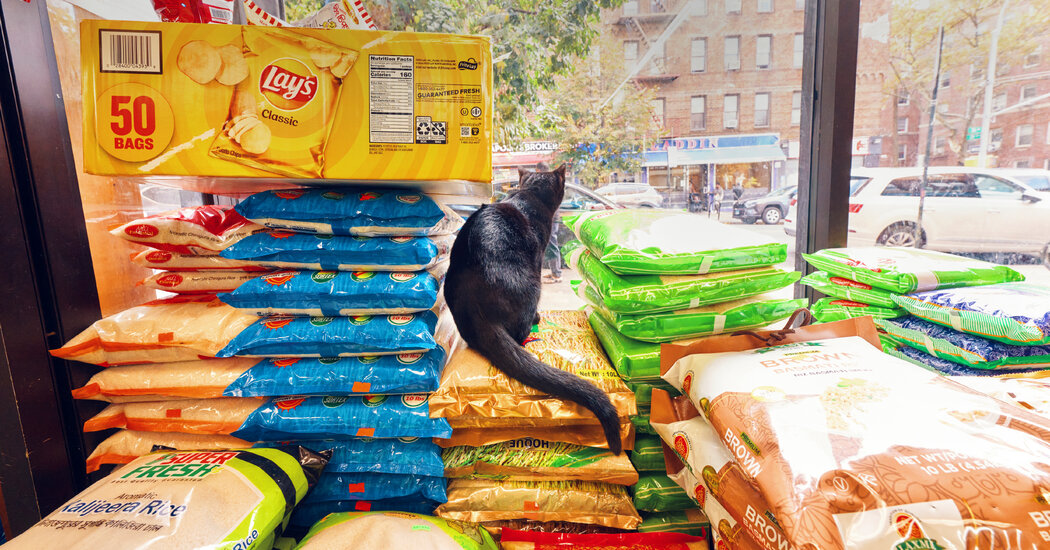
For more than two decades, Bonoful Grocery has served the Bangladeshi community that revolves around a one-block stretch of 36th Avenue in Astoria, Queens, just west of the N/W train, where signs beckon in Bengali and notes of cumin, coriander and green chilies waft across the sidewalks.
The staples found here are not available in your typical supermarket. Species of fish that don’t exist in the United States, such as the river-dwelling keski, arrive from Bangladesh. So do frozen sweets and processed grains like poha, a flattened rice.
Many of them have gotten markedly more expensive over the past few months as the Trump administration’s tariffs have hit Bangladesh — as well as alternative sources, such as India, Pakistan and Thailand — especially hard.
Shohel Ahmed, 48, a tall man with a trim beard who has owned Bonoful Grocery since 2009, shuttles inventory to the store most days from wholesalers in the warehouse districts of Queens.
“New shipment coming, and they increase all the products,” Mr. Ahmed said, with some frustration. He has raised prices in turn. He pointed at one type of rice, for example, that now costs $23 a bag, up from $17. But there are limits to what his customers will pay. “We cannot put too much price, because the community say no,” he said.
President Trump’s broad and hefty tariffs have boosted food prices across the board, extending a period of high inflation from after the pandemic. But the pinch is especially sharp for the immigrant diasporas from countries where tariffs are the highest.
Bangladesh bears 20 percent duties under the “reciprocal” tariff schedule that the White House imposed in August. Queens County has the largest population of Bangladeshi immigrants in the country, about 62,000 spread beyond Astoria into Jamaica and Ozone Park, where several grocery stores supply the tastes of home.
“The first generation of the Bangladeshi community, it’s their historic habit — they can’t change all of a sudden,” said Abu Taher, who runs Time Television, a Bengali-language station in New York City. “Second generation, they can change.”
For centuries, New York has absorbed immigrant communities with their own cuisines and flavors. Grocery stores catering to them have anchored neighborhoods including Flushing, a hub for people from China (average tariff rate: 58 percent), and a Staten Island enclave of arrivals from Sri Lanka (20 percent).
“For many New Yorkers, those provide a sense of cultural identity and connection,” said Kate MacKenzie, the director of the city’s Office of Food Policy. “That is really important, perhaps more so than a sense of food security, finding belonging.”
The effect extends beyond New York. In St. Louis, émigrés from Bosnia (tariff rate: 30 percent) are feeling it, as are Indianapolis’s immigrants from Myanmar (40 percent). America’s largest concentration of people from India (50 percent) lives in the Bay Area, where dozens of South Asian grocery stores have raised their prices.
The first line of defense in the tariff wars are distributors. They have been drawing down credit lines to cover tariffs in the 30 or 45 days before they get paid by their own customers and trying to find countries with lower tariffs that can export similar goods.
Daniel Demeshulam is the chief executive of Bedemco, which imports from all over the world and sells to domestic manufacturers and retailers. There are alternatives for some commodity goods such as cashews, which predominantly come from Vietnam (tariff rate: 20 percent). But he has had to stop buying golden raisins from South Africa (30 percent), for which there is no perfect substitute.
“Everyone is having to borrow more than they had, and with interest rates where they are, it’s going to squeeze us more and more,” Mr. Demeshulam said. Even though he passed some price increases on to customers, the tariffs have wiped out his profits. “We’re losing money on some deals just to keep the business going,” he said.
Brad Koshar runs Jorday Foods, a New Jersey-based importer that supplies grocers, restaurants, food banks and schools with foods from Europe, South America and Asia, including the Middle East. He has had to stop importing from India because, he said, customers wouldn’t accept high enough prices to account for the 50 percent duties. That means a wide variety of snacks and spices are no longer available.
“Small retailers, specialty retailers are suffering because there’s only so much they can pass through on a cost increase,” Mr. Koshar said.
Carrie Garlejo runs a small grocery store in San Diego County, Calif., the home of the nation’s largest community of immigrants from Laos (tariff rate: 40 percent).
Ms. Garlejo’s parents met in a refugee camp in Thailand in the late 1970s. They came to the United States in 1980 and worked in manufacturing until 2004, when they bought a recently opened grocery store in Escondido, called Oriental Food Market, that catered to Laotian immigrants.
It wasn’t an easy business, but they kept it going. Sales accelerated during the pandemic, when more people were cooking at home. Ms. Garlejo took over the company in 2023, after her own career in catering wilted, and rebranded it Rice Pantry.
Although the store specializes in Lao ingredients, importing directly from Laos is difficult for regulatory and logistical reasons. So Ms. Garlejo gets most of her goods from Thailand (tariff rate: 19 percent), where the cuisine is very similar. She can still import the silkworms, mackerel and a dark, earthy type of spinach that people from villages in Laos put in soups.
The business fell off soon after she took over, as inflation forced her to raise prices almost immediately. Over the past few months, tariffs have supercharged the increases. A 50-pound bag of rice went from $48 to $55, and her sales dropped. Food stamp benefits have also been cut over the past couple of years, and more shoppers have tried to economize by driving farther to the big Asian supermarkets like 99 Ranch.
For Ms. Garlejo, 43, the stress is mounting.
“The steady days are the good days,” she said. “The down days are the days where you’re like, ‘I don’t know if I’m going to make it through this.’ I just took it over a couple years ago, and I’m in this position where I may let my parents’ legacy just crumble.”
In Astoria, Mr. Ahmed’s small grocery has generated enough income for him to buy a house in the Jamaica neighborhood of Queens for his four children. But it hasn’t been profitable over the past year, as his clientele has bought only what it really needed and has been bargain-hunting for the rest.
Mr. Ahmed has thought of a way out: becoming a distributor himself. He used to import directly for his store, but got out of the business when dealing with health regulations became too onerous. Now, cutting out the middleman seems like the only viable way to keep prices in check. He traveled to Bangladesh in November to get started.
On a recent sunny Saturday, the tiny store was busy with shoppers peering at prices and examining their receipts. Among them was Ahn Karim, 40, a cheery Astoria resident with a young son in tow.
He came to the United States in 2010 and works as a building inspector for the city; his wife is a teacher. Their modest incomes have been stretched in recent years. Mr. Karim shops in Jackson Heights for better prices on produce, but for the kind of fish he remembers from home, he prefers Bonoful Grocery. It’s now $8 a pound, up from $4 earlier this year.
“Tariffs are terrible,” Mr. Karim said. “At the end of the day, we pay for this price, not the government. They put it on the customer.”
Jeff Adelson contributed reporting.
Lydia DePillis reports on the American economy for The Times. She has been a journalist since 2009, and can be reached at [email protected].
The post Where the Taste of Home Comes With a Tariff Charge appeared first on New York Times.



